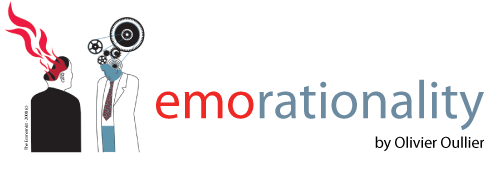On may 24, I gave a keynote lecture at the 2010 ADC Future Summit. The title of my talk was "The promises of neuroscience". I discussed some of the work we are doing with my colleagues at the Cognitive Psychology Lab (Université de Provence) and Center for Complex Systems and Brain Sciences (Florida Atlantic University) on social coordination dynamics of brain and behavior, how they can be used in public policy. I also discussed some of the work we are doing at the "Neuroscience and public policy" programme of the Center for Strategic Analysis of the Prime Minister of France (including our most recent report on how behavioral and brain sciences can improve public health prevention, here).
A lot of questions came up after I discussed how nudges, behavioral economics and social neuroscience can be used to improve public health prevetion, and more broadly in public policy. People wanted to know how these approaches could help sustainable development, education etc. Even on this side of the world people are tired of standard economics it seems!
The usual criticisms came from sociologists regarding the fact that neuroscience does not explain everything. Big news! I do actually agree with that and never said anything near that. This is why neuroscience is just a portion of the work we are doing. Our programme includes social and cognitive psychologists, behavioral economists together with experts in consumer behavior, sociology, decision and social neuroscience, social marketing, philosophy, epistmology and physicists (for models).
As I always mention in my talks and classes, (studying) a brain on its own -without considering its interactions with the world- is rather useless when one is interested in human behavior. But let's face it, the fact something (neuroscience in that case) does not provide all the answers does not mean we should not consider its advances in public policy, especially when more classical approach fail. After all, if we were to use only approaches or scientific fields that work, we would drop a lot things starting with standard economics. On a lighter note, come on, do I go to every talk given by a sociologist asking why there is no neuroscience in it?
But ultimately the long Q&A session on and off stage allowed for some fruitful discussions and maybe collaboration to start.
- 2010 Future Summit website here
- 2010 Future Summit website here







